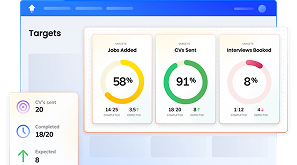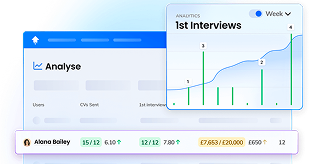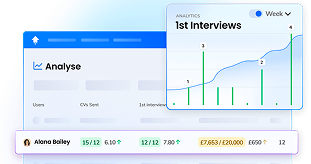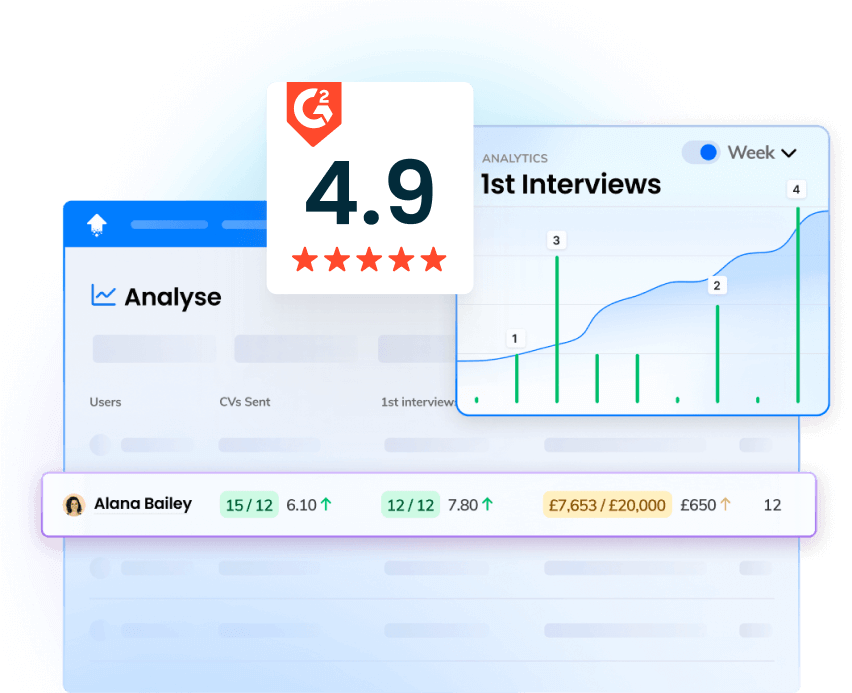Winning new clients as a recruitment agency requires more than just strong candidate sourcing. You need a compelling way to present your services, demonstrate your expertise, and convince potential clients that you’re the right partner.
A well-structured recruitment proposal does exactly that. It outlines how you work, what makes your agency different, and the value you bring to hiring teams. But writing one from scratch every time is inefficient.
That’s why a recruitment proposal template can be a game-changer. Instead of building each proposal manually, a structured template lets you focus on what matters — tailoring your pitch to each client while maintaining professionalism and consistency.
You’ll learn what makes a strong recruitment proposal, why every agency should use a template, and how to customise our free version to win more contracts.
What is a Recruitment Proposal?
A recruitment proposal is a formal document that outlines your agency’s approach to hiring, the services you offer, and the costs involved.
Recruitment proposals are strategic tools that help efficiently convey your recruitment services, streamline the proposal creation process, ensure compliance, and create visually appealing documents that clearly communicate your unique selling points in the competitive recruitment landscape.
But, a strong proposal should do more than just list your services.
It should position your agency as a trusted partner, address common hiring challenges, and set clear expectations from the start.
What Should A Recruitment Proposal Include?
To be effective, a recruitment proposal should cover:
- Executive summary: A high-level overview of your agency and the value you provide.
- Recruitment services offered: A clear breakdown of the hiring solutions you provide, from full-time placements to temp-to-perm hires.
- The recruitment process: How you source, vet, and place candidates.
- Pricing and fees: A transparent breakdown of costs, including placement fees, hourly rates, and any additional charges.
- Terms and conditions: Important details such as refund policies, proposal validity, and contract renewal terms.
- Client testimonials and case studies: Real-world success stories that demonstrate your agency’s impact.
- Recruitment strategy: The importance of a well-structured recruitment strategy in addressing the specific needs of the client, accounting for external factors such as the job market, and being informed by direct conversations with the client to understand their unique culture and expectations.
A well-structured proposal should answer three key questions: What services do you offer? How do you deliver results? Why should a client choose you?
Once you have the proper structure, the next step is ensuring your proposal is both efficient and persuasive.
Why Do Recruitment Agencies Need a Recruitment Proposal Template?
Even if you’re confident in your ability to sell your services, manually creating proposals from scratch is time-consuming. A structured template simplifies the process while maintaining a professional and polished approach.
Here’s how…
Saves time and effort
A template eliminates the need to format and structure every proposal manually, allowing you to focus on personalising the content.
Creates a more professional first impression
A well-designed proposal demonstrates attention to detail and ensures consistency in branding and messaging.
Builds client confidence
By clearly outlining your process, pricing, and value, a proposal reassures potential clients that they’re making an informed decision.
Differentiates your agency
A strong proposal highlights your agency’s strengths, whether that’s access to a global talent network, data-driven hiring strategies, or industry-specific expertise.
Speeds up contract negotiations
When expectations are clearly set upfront, clients can make faster decisions, reducing unnecessary back-and-forth discussions.
Strengthens Long-Term Client Relationships
A well-structured proposal doesn’t just help secure new clients — it lays the foundation for lasting partnerships. By setting clear expectations from the start, agencies can deliver consistent results, leading to higher client satisfaction and increased contract renewals.
When clients trust your process and see successful placements, they’re far more likely to continue working with you long-term.
A strong proposal is only effective if it’s tailored to the client. The next step is making sure you customise your template effectively.
How to Use the Recruitment Proposal Template
Using a template is not about sending a one-size-fits-all document. The goal is to start with a structured foundation and then personalise it to fit the needs of each client.
Steps to customise the template
Download and personalise the template
Update it with your agency’s branding, key services, and industry focus.
Introduce a job proposal template to effectively showcase how your agency can meet employer objectives. This document is crucial in recruitment proposal creation, detailing necessary components that outline the recruitment process and key terms for effective proposal writing.
Tailor it for each client
Incorporate details about the client’s hiring challenges, industry, and specific recruitment needs.
Clearly define your services
Spell out your recruitment solutions, such as executive search, contract hiring, or temp-to-perm placements.
Be transparent about pricing
Clients appreciate clarity on fees, hourly costs, and refund terms.
Add credibility with testimonials and case studies
Include examples of successful placements and satisfied clients.
Set measurable expectations
Define key hiring metrics such as time-to-fill, retention rates, and contract renewal percentages to reinforce the value of your services.
With the strategy in place, here are the must-have sections to include in your template.
Key Sections of a Recruitment Proposal Template
A strong recruitment proposal isn’t just a sales document — it’s a structured plan that reassures potential clients they’re making the right decision. While every proposal should be tailored to the client’s needs, the core structure remains the same.
Your recruitment proposal should include:
#1 Executive Summary
Start with a concise overview of your agency, the industries you serve, and the value you provide. This section sets the stage for the rest of the proposal, helping potential clients quickly understand who you are and how you can help them hire top talent.
#2 Recruitment Objectives
Clearly define the hiring goals for the engagement. Whether the client needs long-term placements, temporary staffing, or a high-volume hiring solution, outline how your approach aligns with their business needs.
#3 Recruitment Services Offered
List the specific recruiting services your agency provides, emphasizing the importance of consistency in presenting these services. This may include full-time hiring, temp-to-perm placements, contract staffing, executive search, and candidate sourcing strategies.
If applicable, mention any additional support, such as workers’ compensation insurance assistance or compliance consulting for highly regulated industries.
#4 The Recruitment Process
Walk clients through how you source, vet, and place candidates. Provide a clear step-by-step breakdown — from the initial consultation and job analysis to screening, interviewing, and final placement.
This section should demonstrate your agency’s expertise and structured approach to delivering high-quality hires. Additionally, detail the final steps in the recruitment process, including how to manage the selection process and formally extend an appointment and employment offer to successful candidates.
#5 Cost and Fee Structure
Transparency is key. Outline the pricing structure, including professional fees, fixed hourly rates, and any additional costs related to background checks, assessments, or compliance verification.
Clients should have a clear understanding of what they’re paying for.
#6 Timeline and Deliverables
Hiring delays can be costly, so set expectations upfront. Define estimated timelines for sourcing, interviewing, and hiring candidates.
If specific steps, like background checks or employment verification, require additional time, note this to help manage client expectations.
#7 Terms and Conditions
Cover important contract details such as the proposal’s validity period, refund policies, and renewal terms.
This section ensures that both parties are aligned on service agreements, reducing miscommunication and potential disputes.
#8 Client Testimonials and Case Studies
Prove your track record with real-world success stories. Showcase previous clients’ feedback, successful placements, and measurable results to build trust and credibility.
Testimonials and case studies can be a deciding factor for prospects evaluating multiple agencies.
#9 Additional Services
Recruitment agencies that go beyond standard hiring services often stand out. If you provide consulting, employer branding support, or workforce strategy planning, highlight these offerings here.
For example, some agencies assist clients with crafting compelling job descriptions, designing branded hiring materials, or creating career pages to attract top talent.
#10 Common Mistakes to Avoid in a Recruitment Proposal
Even well-intentioned proposals can fall short if they lack clarity, transparency, or client-specific customisation. Here are common mistakes agencies should avoid:
- Unclear pricing: Clients need a full breakdown of service fees, including placement costs, hourly rates, and any additional charges.
- Overly generic proposals: Each proposal should be tailored to the client’s industry, hiring challenges, and workforce needs. A one-size-fits-all approach weakens your value proposition.
- Lack of measurable success metrics: Companies want to see retention rates, contract renewal percentages, and average hiring timelines to assess effectiveness.
- Failure to address compliance requirements: Omitting crucial details like background checks, workers’ comp insurance, and legal considerations can make your proposal appear incomplete.
- Missing opportunities to highlight value-added services: Many agencies do more than just fill roles. If you offer hiring strategy consulting, employer branding assistance, or long-term workforce planning, make sure to showcase these strengths.
- Neglecting the importance of expertise and team qualifications in the recruitment industry: Highlighting your team's qualifications and expertise builds trust with potential clients and demonstrates your capability to meet their hiring needs effectively.
A well-structured proposal should not only outline services and pricing but also demonstrate credibility, transparency, and expertise. With these elements in place, your proposal will have a stronger impact and increase the likelihood of securing long-term client relationships.
A Few Tips for Writing a Strong Recruitment Proposal
- Be Clear and Concise – Avoid unnecessary jargon and keep your message straightforward.
- Focus on Value – Highlight how your agency’s recruitment services help clients achieve their hiring goals.
- Use Data to Support Your Claims – Include metrics on successful placements, contract renewal rates, and client satisfaction scores.
- Personalise the Proposal – Address the client’s specific industry, hiring challenges, and business needs.
- Offer Flexible Pricing Models – Provide options for different hiring models, including temp-to-hire resources, full-time hiring, and short-term contracts.
You have all the tools you need to create the proposal, now, it’s over to you to execute.
Your Winning Recruitment Proposal: Time to Put Your Best Pitch Forward
A recruitment proposal isn’t just a formality — it’s your agency’s opportunity to stand out, build trust, and secure long-term clients. When done right, it demonstrates your expertise, sets clear expectations, and streamlines the hiring process for both you and your prospects.
Now that you know what makes a strong proposal, it’s time to put that knowledge into action. Instead of starting from scratch, use our free recruitment proposal template to create a professional, persuasive pitch that wins more contracts and strengthens client relationships.
Download the template now and take the next step toward growing your agency.
Your Winning Recruitment Proposal: Time to Put Your Best Pitch Forward
A recruitment proposal isn’t just a formality — it’s your agency’s opportunity to stand out, build trust, and secure long-term clients. When done right, it demonstrates your expertise, sets clear expectations, and streamlines the hiring process for both you and your prospects.
Now that you know what makes a strong proposal, it’s time to put that knowledge into action. Instead of starting from scratch, use our free recruitment proposal template to create a professional, persuasive pitch that wins more contracts and strengthens client relationships.
Download the template now and take the next step toward growing your agency.




















